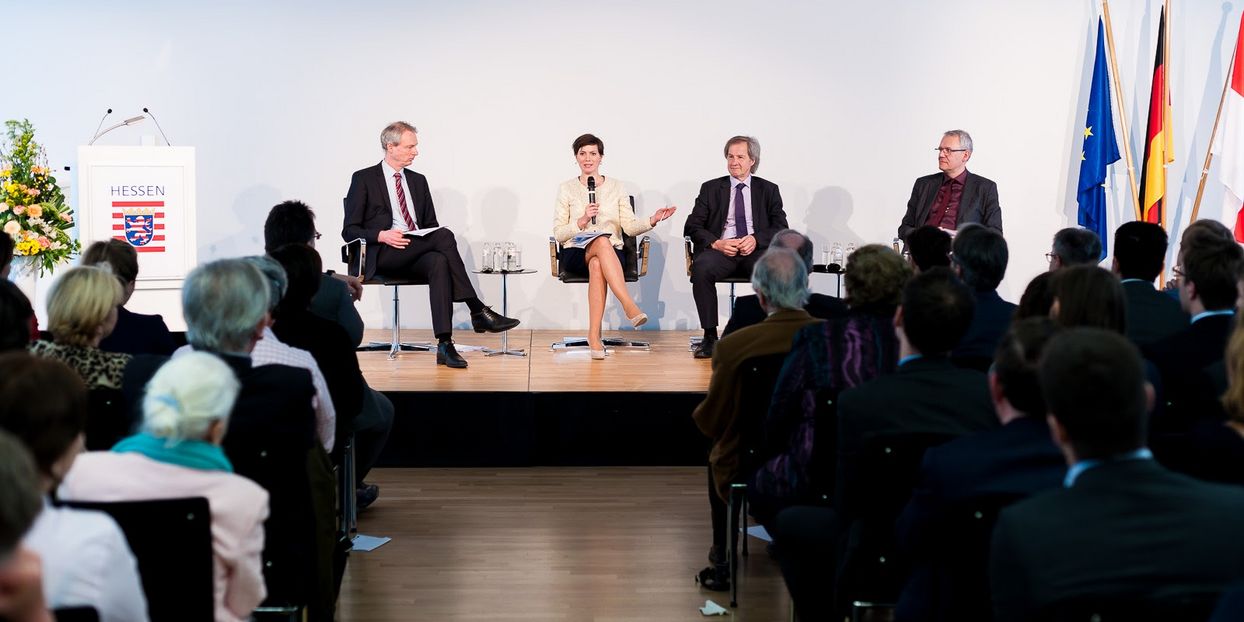
60 Jahre Römische Verträge
Crisis Talk on 29 March 2017
25 March 2017 marked the sixtieth anniversary of the signing of the Treaties of Rome. Four days later, on 29 March 2017, the Leibniz Research Alliance "Crises of a Globalised World" organised its fourth "Crisis Talk" together with its partners - the Frankfurt Cluster of Excellence "The Formation of Normative Orders", the Representation of the State of Hesse to the EU and the European Office of the Leibniz Association. The title of the event was "60 Years of the Treaties of Rome - The Birth of the European Union. Integration despite the crisis". The subtitle, which links the past of European integration with its present perceived as crisis-ridden, was of particular importance on this day. After all, immediately before the event began, the European institutions received the news from the British head of government Theresa May that Great Britain would like to withdraw from the EU under Article 50 within two years. This topicality of the day may have been one reason why the fourth Crisis Talk also generated so much visitor interest. More than 200 visitors came to the national representation at lunchtime.
In his welcoming speech, the Hessian State Secretary for European Affairs, Mark Weinmeister, drew the bow from Rome sixty years ago to Brussels today. Prof. Dr. Andreas Wirsching, Director of the Institute of Contemporary History Munich-Berlin, took up this theme and worked out that crisis awareness has always been the driving force behind European integration. Crises sharpened the awareness of interdependence and underlined the dependence on others. It is not the idealistic idea of a common identity, but the complementary interests of the European democracies that carry the European idea. Thus he showed how through history, moments of crisis have repeatedly provided the impetus to deepen integration. The Treaties of Rome, for example, could not be understood without considering the failure of the European Defence Union three years earlier. The fact that sixty years ago Great Britain deliberately refused to participate in the Messina Process, which led to the Treaties of Rome, only to submit its first application for membership four years later, shows how, in the long term, interests have a stronger effect than nationalistically based positions. Although the EU's current situation differs from that of the past, since the ubiquity of the sense of crisis has replaced the linear belief in progress that still had a formative effect in the 1960s, it is still true today that the European conviction manifested in institutions and the awareness of situational challenges release forces that make it possible to overcome the crisis. Dialectical thinking allows optimism and finds confirmation in the White Paper process initiated by the Commission or in the strengthening civil society movements such as Pulse of Europe.
In the discussion chaired by Cornelia Primosch (ORF), Prof. Dr. Christian Calliess, member of the European Centre for Policy Strategy at the Commission, took the ball rolling straight away. The Rome Declaration - on the occasion of the sixtieth anniversary - is an act of self-assurance as well as a signal of new beginnings. It underlined how far we had come with the legal integration of Europe and made it clear that the political areas of Europe beyond the internal market - such as Schengen and the euro area - had to be consolidated and made functional. It is not about "More Europe", but about a functioning Europe. However, in order to establish a basic consensus in and about the member states to make these adjustments, the White Paper process was launched, in which first of all the attitude towards and expectations of the European Union were clarified and made explicit - as a basis for realising the complementary interests that Andreas Wirsching had pointed out.
Jo Leinen, Member of the European Parliament since 1999 and President of the European Movement International, called for a more offensive commitment to Europe, including "More Europe", as outlined in the fifth scenario of the White Paper. Leinen described his encounters with European young people, their acclimatisation to and commitment to an integrated continent. A resource of legitimacy that is still too little recognised and used.
The ensuing debate focused on issues such as the strategy of differentiated integration, which has long been a possibility and partial reality; the danger of populist challenges, which should neither be over- nor underestimated; and the need for a new Convention that takes citizenship seriously. Leinen and Wirsching agreed that a new Convention could provide an impetus that would counteract the distorting effects of communication between the public authorities of the Member States by creating a genuine dialogue. Mark Weinmeister concluded the debate, which was not simply a mood-lifting event on Brexit Day, but showed what the foundations and convictions are that support the European project.
